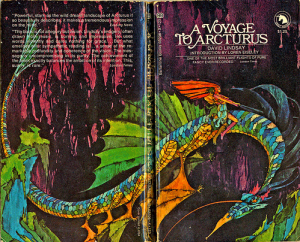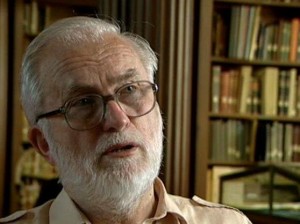As part of Book Week Scotland, the Scottish Book Trust are holding a vote to discover the most loved characters in Scottish fiction. Here, the Library Annexe staff put forward their own favourites.
—
One of the interests that the Annexe team has in common is a love of sci-fi, which has begun a continuous stream of talk over lunch breaks and has culminated in the recent founding of the (small and unofficial) Annexe Science Fiction Club.
In this vein, and to promote what I think is one of the most underrated Scottish fiction books of the last century my nomination for favourite character goes to Maskull, the protagonist of David Lyndsay’s novel A Voyage to Arcturus.
Maskull, a man from Earth, awakens alone in a desert on the planet Tormance, seared by the suns of the binary star Arcturus, and embarks on an extraordinary pilgrimage with an extraordinary revelation at the end.
Having sold only 596 copies of its initial print run of 1430, Lyndsay’s masterpiece has since found a place as a classic of speculative fiction, earning itself a place in Harold Bloom’s the Western Canon, and earning words of praise by masters from J.R.R. Tolkien to Philip Pullman.
Even though he is very far from the type of hero one can relate to, I often find myself thinking about Maskull (and Lyndsay’s wildly imaginative world) when I really should be working.
And if that is not a sign of a good book, I don’t know what is.
Iraklis Pantopoulos, Library Annexe Assistant
Find A Voyage to Arcturus on the University of Edinburgh online catalogue
—
When picking a favourite Scottish character from literature, I am drawn to my two favourite Scottish authors, Muriel Spark and Iain Banks, but I find myself struggling to choose a best character. The lure of the enigmatic Long John Silver is also hard to resist – a character so well drawn, he has become the template for all pirates since.
However, I am going to collectively go for Grant Morrison’s The Invisibles, a weird and mysterious bunch, mainly because this is the book that introduced me to his work (and is the only DC comic that is ever likely to feature Greenock as a location).
Read about The Invisibles at Wikipedia
Morrison’s work on Batman has been exceptional, but somehow Batman doesn’t feel very Scottish… apart from in Batman: Scottish Connection, as drawn by Glaswegian Frank Quietly.
(It’s terrible).
Find Grant Morrison’s Arkham Asylum on the University of Edinburgh online catalogue
Why not vote for your favourite at the Book Week Scotland website?
Carl Jones, Library Annexe Supervisor



